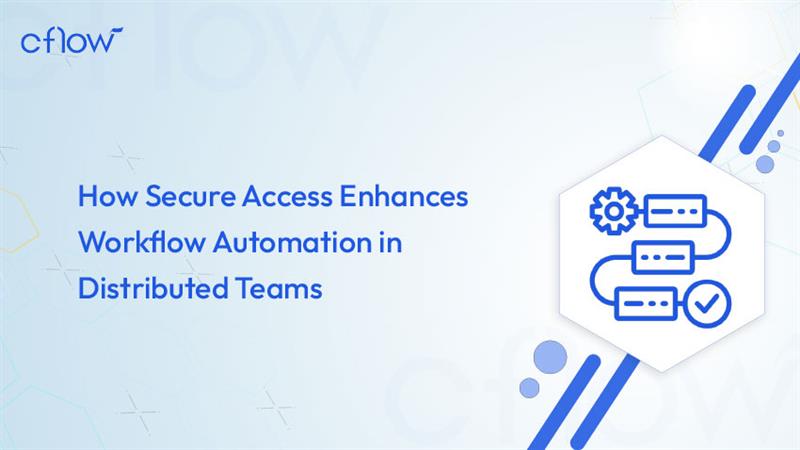How Secure Access Enhances Workflow Automation in Distributed Teams

Modern enterprises confront a formidable challenge. Distributed teams now span continents, necessitating seamless collaboration tools. Traditional office security models are no longer viable. Organizations grapple with the delicate balance between productivity and protection. Workers demand instant access to company resources from anywhere.
Simultaneously, IT departments face the daunting task of preventing data breaches and ensuring compliance. Secure access solutions bridge this critical gap. They facilitate automated workflows while upholding stringent security standards. VPN technology forms the cornerstone of these protected digital workspaces.
The connection between robust security and seamless automation is not universally understood. Many companies view these as separate concerns. Yet, the most successful organizations recognize that remote work security is integral to effective automation.
This integration revolutionizes team operations. Secure access emerges as the invisible backbone supporting complex automated processes. It empowers distributed workforces to maintain enterprise-level security while preserving efficiency and innovation.
Table of Contents
Building Secure Foundations for Distributed Team Automation
Modern distributed teams necessitate robust security frameworks that facilitate automated workflows while safeguarding sensitive data. The transition to remote collaboration has unveiled new vulnerabilities, surpassing the capabilities of traditional security models.
To address these challenges, organizations must adopt layered security approaches, ensuring operational efficiency while protecting critical business processes.
Establishing trust mechanisms across diverse platforms and geographic locations is crucial for the success of distributed teams. These security foundations enable teams to harness workflow automation without compromising data integrity or regulatory compliance.
Critical Security Challenges in Remote Workflow Management
Remote teams encounter unique security challenges that can disrupt automated processes and expose organizations to significant risks. Understanding these challenges is vital for developing effective mitigation strategies.
Data Breach Risks in Unsecured Networks
Unsecured home networks and public Wi-Fi connections serve as entry points for cybercriminals targeting automated systems. Remote workers often connect through networks lacking enterprise-grade protection. This vulnerability is exacerbated when sensitive data flows through workflow automation platforms.
Organizations experience 40% higher breach incidents when employees work from unsecured locations. The automated nature of modern workflows means that a single compromised connection can affect multiple business processes simultaneously.
Identity Verification Across Multiple Platforms
Distributed teams utilize numerous applications and platforms throughout their workday. Each system necessitates separate authentication, creating complexity that can weaken the overall security posture. Workers may resort to password reuse or simplified credentials to manage multiple logins. This fragmentation complicates maintaining consistent identity verification standards across all workflow automation tools and platforms.
Essential Components of Secure Access Architecture
Effective security architecture combines multiple technologies to create robust protection for distributed team operations. These components work together to establish trust while enabling seamless automation.
Multi-Factor Authentication Systems
Multi-factor authentication serves as the first line of defense against unauthorized access to automated workflows. Modern MFA solutions go beyond simple SMS codes to include biometric verification and hardware tokens. These systems adapt to user behavior patterns and risk levels. Implementation of MFA across all workflow automation platforms reduces unauthorized access incidents by 99.9% according to industry studies.
Zero-Trust Network Protocols
Zero-trust architecture assumes no user or device should be trusted by default, regardless of location or previous authentication. This approach continuously verifies every access request and monitors all network activity.
Zero-trust protocols integrate directly with workflow automation systems to provide real-time security validation. Organizations implementing zero-trust see significant improvements in network security and reduced incident response times.
Integration Points Between Security and Automation
The convergence of security measures and automated workflows creates critical integration points that require careful management. These intersections determine overall system effectiveness and user experience.
API Security Management
Application Programming Interfaces enable different systems to communicate and share data within workflow automation environments. Securing these connections requires encryption, rate limiting, and continuous monitoring. API vulnerabilities can expose entire automation chains to security threats. Proper API security management ensures that automated processes maintain data integrity while preventing unauthorized system access.
Automated Compliance Monitoring
Compliance requirements demand continuous oversight of security protocols and data handling practices. Automated monitoring systems track user activities, data flows, and system configurations in real-time. These tools generate alerts when violations occur and maintain an audit trail for regulatory reporting.
Integration of compliance monitoring with workflow automation creates self-regulating systems that maintain security standards without manual intervention.
End-to-end workflow automation
Build fully-customizable, no code process workflows in a jiffy.
How VPN Technology Revolutionizes Remote Team Productivity
VPN solutions have transformed remote work environments, providing secure, high-performance connectivity akin to office settings. They eliminate geographical barriers while upholding enterprise-grade security standards. Modern organizations utilize VPN infrastructure to create unified work environments, supporting both individual tasks and collaborative projects.
The transformation goes beyond mere network access. VPN technology enhances team productivity through optimized data flows and reduced connection overhead. Teams can access corporate resources with the same speed and reliability as traditional office settings.
Seamless Resource Access and Connectivity
Today, VPN solutions offer instant access to corporate systems without compromising security or performance. Workers can connect to internal networks from any location, maintaining full functionality of business applications. This connectivity is the cornerstone of effective remote collaboration across distributed teams.
Corporate Database Integration
VPN technology enables direct database connections that mirror on-site access patterns. Teams can query, update, and manage corporate databases in real-time. This capability ensures data consistency across all team members, regardless of their physical location.
Cross-Platform Application Access
Modern VPN systems support diverse application ecosystems, including legacy systems and cloud-based platforms. Users can seamlessly switch between different software environments. This flexibility ensures workflow continuity across various project requirements and technical specifications.
Advanced Security Features for Automated Processes
Security integration within VPN frameworks supports automated workflow processes while maintaining data protection standards. These systems provide encrypted connections that secure all data transmissions during automated operations. Advanced authentication protocols ensure that only authorized processes can access sensitive corporate resources.
Encrypted Data Transmission During Automation
Automated workflows benefit from end-to-end encryption that protects data throughout processing cycles. VPN tunnels maintain security integrity even during high-volume data transfers. This protection extends to all automated communications between team members and corporate systems.
Secure Cloud Service Integration
VPN technology facilitates secure cloud integration that supports scalable automation solutions. Teams can leverage cloud resources while maintaining corporate security policies. This integration enables flexible resource allocation based on project demands and team
requirements.
Measurable Performance Improvements
Organizations report significant productivity gains following VPN implementation across distributed teams. Performance metrics show improved collaboration efficiency and reduced project completion times. These improvements directly correlate with enhanced remote
collaboration capabilities and streamlined access to corporate resources.
Reduced Latency in Global Communications
Optimized VPN routing reduces communication delays between global team members by up to 40%. Teams experience faster file transfers and more responsive video conferencing. These improvements enhance real-time collaboration and decision-making processes across time
zones.
Streamlined Project Management Workflows
VPN-enabled project management systems provide centralized access to project resources and documentation. Teams can update project status, share files, and coordinate tasks without connectivity delays. This streamlined approach increases overall team productivity and project delivery success rates.
Conclusion
Investments in secure access solutions yield profound transformations for distributed workforces. The synergy between advanced cybersecurity and automated workflows lays a solid groundwork for enhanced productivity and protection.
This integration is critical for the success of modern organizations. Modern access control systems, when combined with cutting-edge network protocols, significantly boost team performance. Companies witness up to 40% quicker project completion rates, thanks to the elimination of connectivity hurdles through secure workflow automation.
Remote teams enjoy immediate access to vital resources, all while upholding stringent security standards. The deployment of VPN technology stands as a foundational element for effective distributed operations. It facilitates smooth collaboration across diverse geographical locations, safeguarding data integrity and operational security.
This allows teams to concentrate on their core tasks, unencumbered by the complexities of security protocols. The future of secure access technologies promises to further support the escalating need for adaptable work arrangements. Organizations that prioritize security-first automation strategies will maintain a competitive edge in the evolving distributed business environment.
For success, a holistic approach is essential, viewing security as a facilitator, not a hindrance. Companies must assess their current infrastructure, pinpoint integration opportunities, and deploy scalable solutions that meet their distributed team’s needs.
The investment in secure workflow automation yields substantial returns, including enhanced productivity, diminished security threats, and improved operational efficiency.
What should you do next?
Thanks for reading till the end. Here are 3 ways we can help you automate your business:

Do better workflow automation with Cflow
Create workflows with multiple steps, parallel reviewals. auto approvals, public forms, etc. to save time and cost.

Talk to a workflow expert
Get a 30-min. free consultation with our Workflow expert to optimize your daily tasks.

Get smarter with our workflow resources
Explore our workflow automation blogs, ebooks, and other resources to master workflow automation.
Get Your Workflows Automated for Free!


